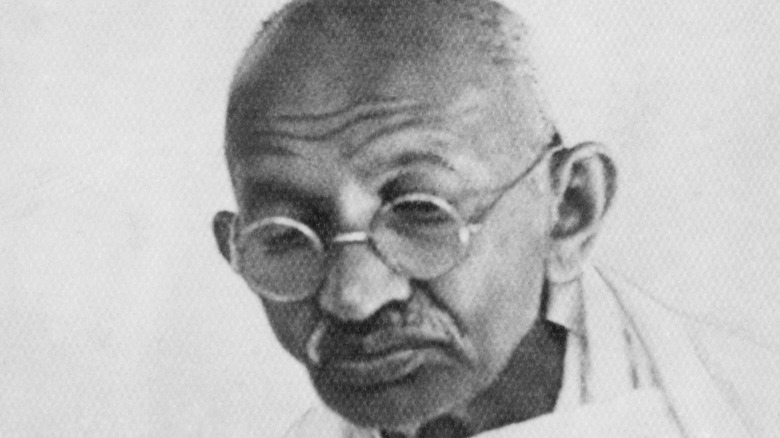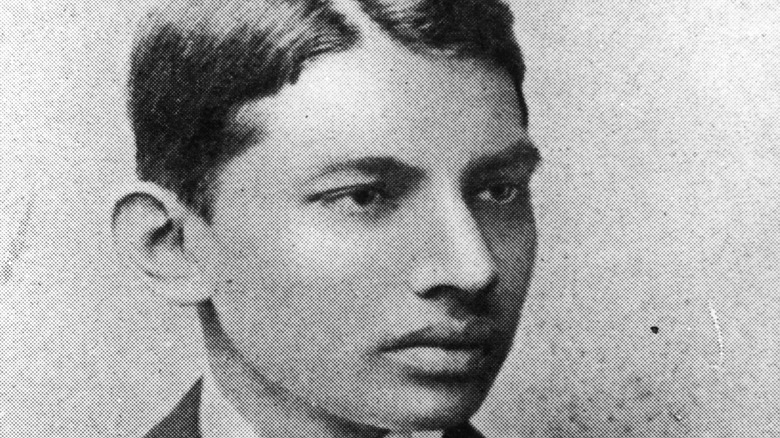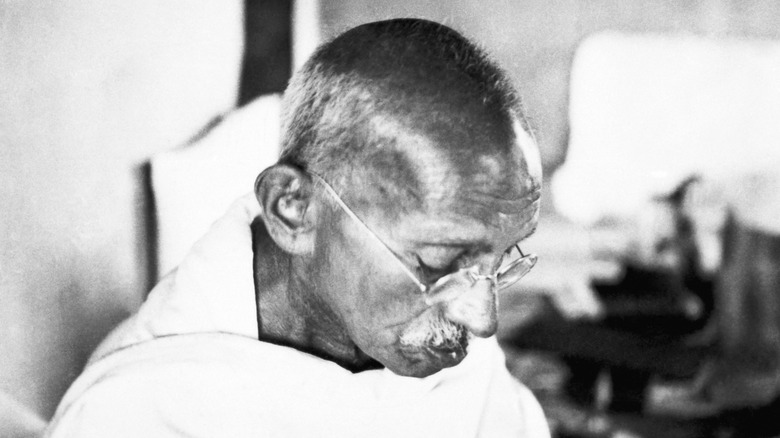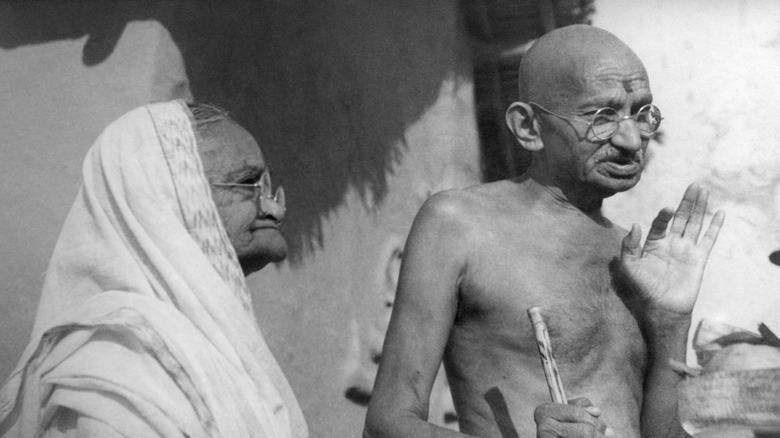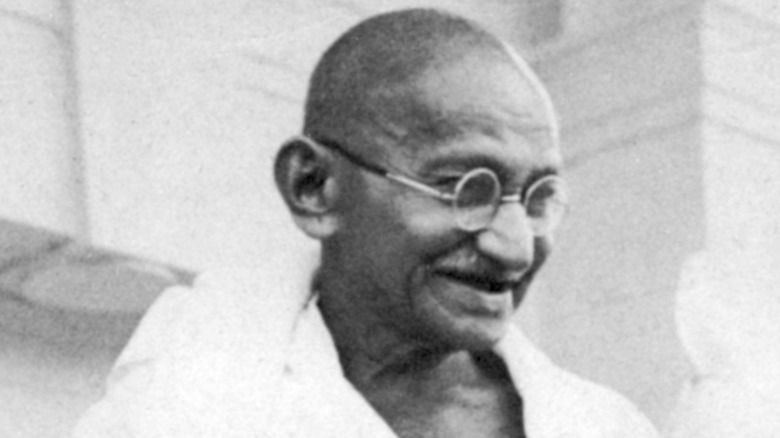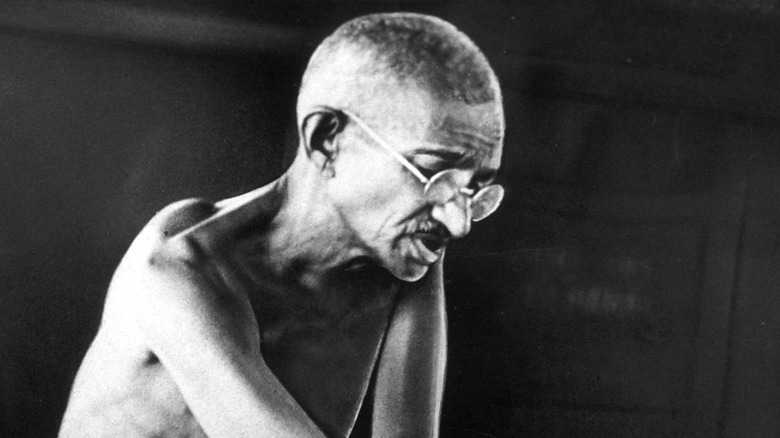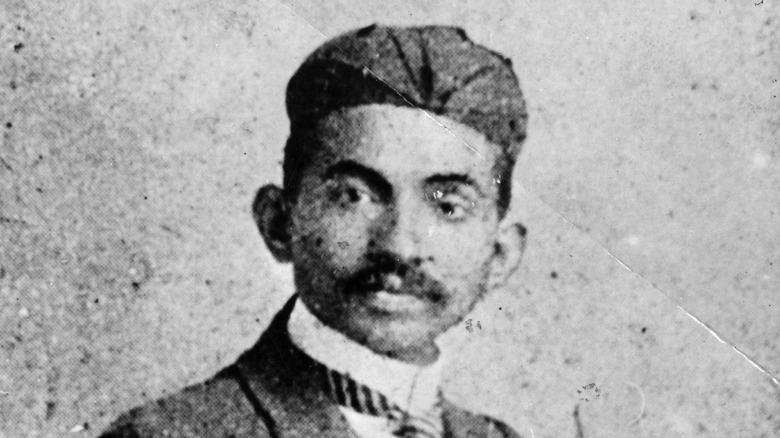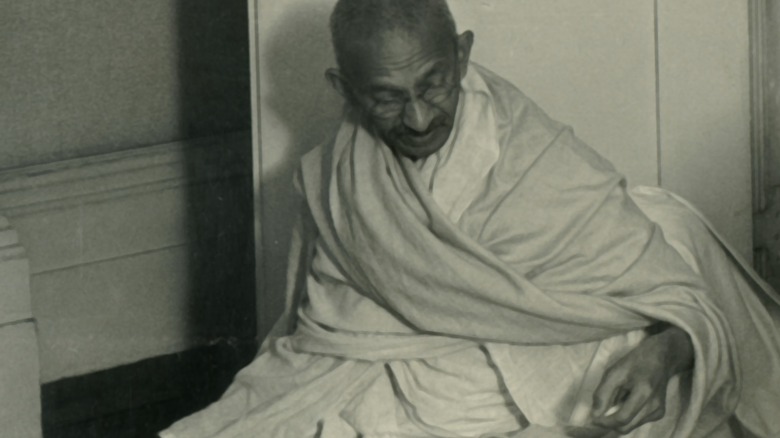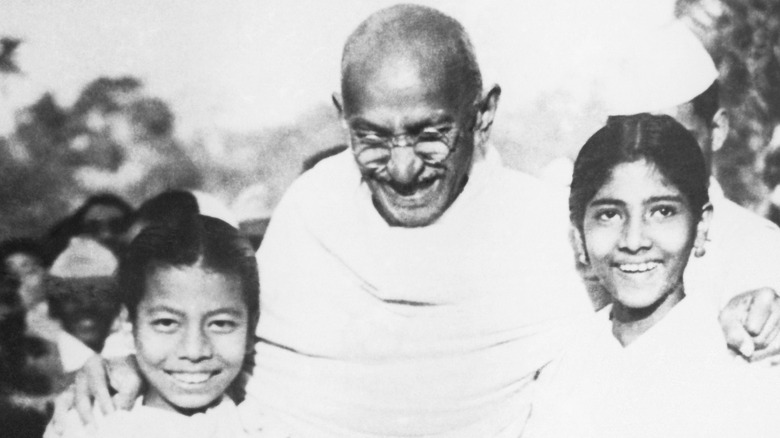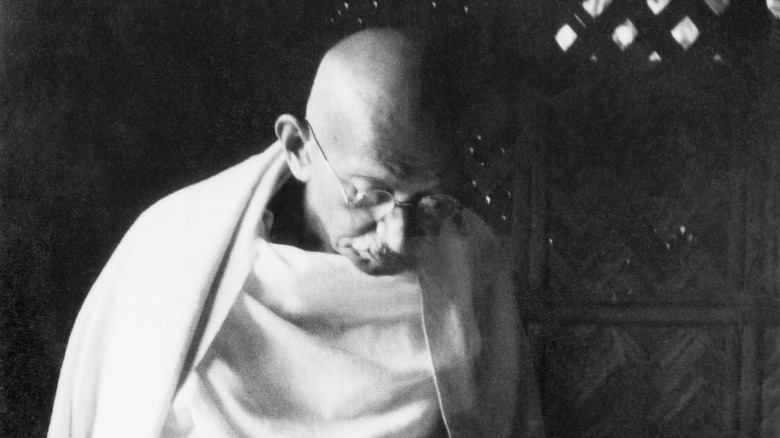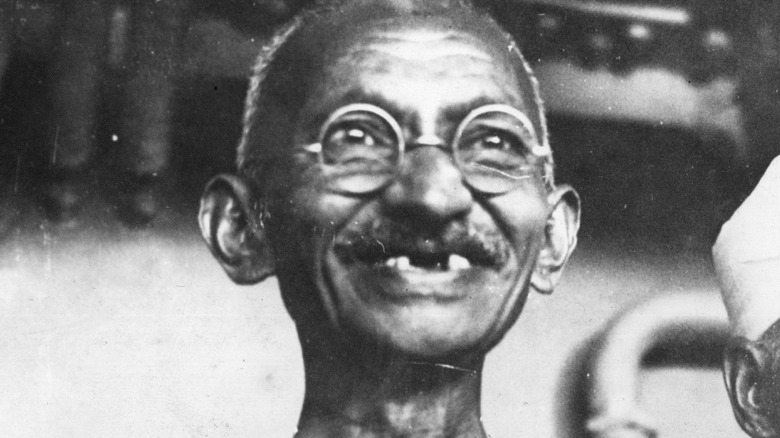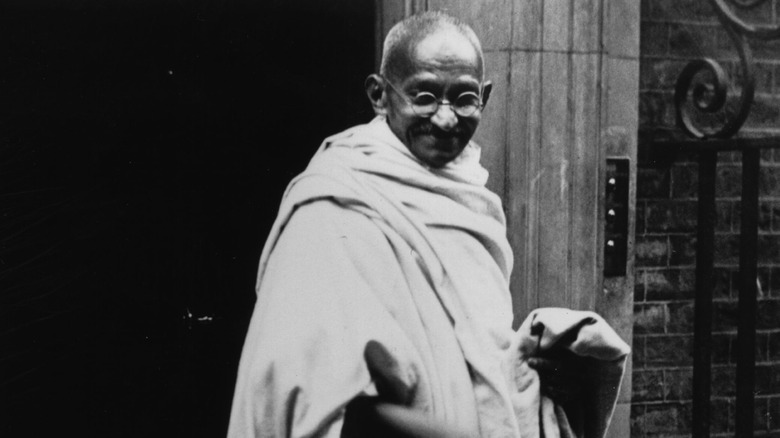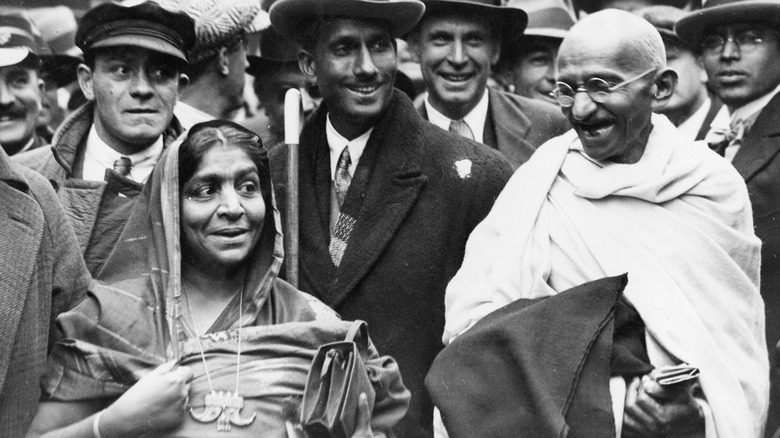What You Didn't Know About Mahatma Gandhi
Mahatma Gandhi is widely regarded as one of the most peace-loving historical figures in pop culture today. This holier-than-thou image of him is propped up by the countless number of photos of him namaste-ing and bowing his head as if he'd never hurt a fly. According to Britannica, his doctrine of nonviolent protest — what he called satyagraha — led to the liberation of India from British colonial rule and garnered him the admiration of people who hope for peace the world over. He famously protested the caste system imposed on India by its colonizers, bringing about significant social change by lifting some of the social stigma placed upon the "untouchables" — the extremely derogatory term used to refer to the citizens of the lowest level of that unjust system.
His large nonviolent protest that went down in history as the Salt March is a highlight of the lengthy 1982 biopic starring Ben Kingsley, but the film left some rather interesting and important details of the pacifist's life. Like Mother Teresa, what you didn't know about Gandhi will absolutely shock you and have you questioning your preconceived notions of his inherent goodness.
He was a shy student
According to the book "The Life of Mahatma Gandhi" by Louis Fischer, Gandhi didn't consider himself to be a particularly gifted student, struggling with math and trying hard to do well in school. He later said, "My intellect must have been sluggish, and my memory raw." Also, he was a rather shy student who preferred to avoid interacting with his peers and would go home directly after school, afraid that someone may tease him or ridicule him if he stayed. He said, "My books and lessons were my sole companions."
Additionally, Gandhi didn't like pursuing gymnastics or cricket as a student because he believed that physical exertion was a waste of time. He was also a scared kid who was uncomfortable with the idea of ghosts and was afraid of thieves and serpents. He reflected on his childhood later and admitted, "I dire not dare to stir out of doors at night ... I felt ashamed of myself."
He started smoking as a child
While this may seem hard to believe, it's true that there was a time when Mohandas Karamchand Gandhi developed a smoking habit, something that he wrote about in his autobiography, "The Story of My Experiments with Truth." He recalled that in his younger days, he started smoking with one of his relatives and admitted that they had seen an uncle smoking and felt tempted to try it. He wrote, "But we had no money. So we began pilfering stumps of cigarettes thrown away by my uncle."
When the used cigarettes started feeling inadequate, they started stealing cash from the house help in order to get their hands on more cigarettes. Gandhi wrote, "In the meantime, we heard that the stalks of a certain plant were porous and could be smoked like cigarettes. We got them and began this kind of smoking." However, both of them eventually decided to quit the habit for good, and Gandhi wrote that as an adult, he was never tempted to smoke and didn't understand why so many people get addicted to it.
He got married to his wife at the age of 13
Mahatma Gandhi was 13-years-old when he tied the knot with his wife, Kasturba (who was 14 at the time) in 1883. According to The Print, it was difficult for Gandhi to accept his responsibilities, and he tried to learn more by allegedly consulting a pamphlet that outlined what a "good husband" should be like. Unfortunately, the publication says he ended up becoming a controlling and jealous husband who told his wife to "seek his permission every time she wanted to step out of the house."
Gandhi even lost his temper when he found out that his wife had gone to the temple with his mother without speaking to him first. However, Kasturba wasn't a submissive woman. As Gandhi wrote in "The Story of My Experiments with Truth," she chose to step out of their home whenever she felt like it, making it clear that she would not be controlled or manipulated. Gandhi wrote, "I wanted to make my wife an ideal wife. My ambition was to make her live a pure life, learn what I learnt, and identify her life and thought[s] with mine."
A friend encouraged him to visit a brothel
Mahatma Gandhi found himself struggling with his ethics when he was sent to a brothel. Per "The Story of My Experiments with Truth," a friend arranged the meeting for him and said that the expenses were taken care of. Gandhi wrote that he wasn't able to say a word in front of the woman he was with and was thrown out of the place after the lady grew impatient with him.
He felt insulted at the time, questioned his manhood, and wrote that he "wished to sink into the ground for shame." He added that there were similar instances later in his life and wrote that it was "good fortune" that allowed him to escape without consequences. He wrote, "From a strictly ethical point of view, all these occasions must be regarded as moral lapses; for the carnal desire was there ... but from the ordinary point of view, a man who is saved from physically committing sin is regarded as saved."
He was keen on studying in England despite strong resistance
As highlighted in "The Life of Mahatma Gandhi" by Louis Fischer, Gandhi went to a college in a nearby town after finishing high school but realized that he wasn't a fan of the place and wanted to go abroad. His mom wondered how he'd be able to afford the fees, but Gandhi was adamant about studying in England and tried to apply for a local scholarship. Unfortunately, he failed to get it.
Eventually, Gandhi's brother volunteered to help him out financially, but he had another obstacle to overcome — his mom wasn't keen on sending her son to a faraway country and was scared that he'd fall prey to temptation in England. A Jain monk intervened and made Gandhi swear that he would never "touch wine, women, or meat," to which he agreed. This was enough to comfort his mom, and she finally relented; Gandhi, happy and grateful for the opportunity, left for Mumbai with his brother in June 1888 to get ready for his trip to England.
According to Livemint, as a law student in London, Gandhi experimented by signing up for dance and violin classes, showing up for lectures on Christianity, and improving his English skills. At some point, he also realized that he would need to be careful about money and started tracking his total expenses, cooking his own meals, and staying in a modest setting.
Law wasn't easy for him at first
Per Hindustan Times, after finishing his law studies, Mahatma Gandhi returned to India as a hopeful 21-year-old and attempted to find work in Mumbai. Things were tougher than he expected, and he found it difficult to hold his own. Writing about his first case at a court in the city, he mentioned that he was rather anxious during a cross-examination and couldn't talk to the witness. Gandhi wrote in "The Story of My Experiments with Truth" that he struggled to come up with questions and explained, "I stood up, but my heart sank into my boots. My head was reeling, and I felt as though the whole court was doing likewise."
He ended up leaving the court, acknowledging that he would be unable to take the case any further. Gandhi wrote that the incident was highly embarrassing for him, and he told himself that he wouldn't take on more cases until he felt strong enough to fight them. He ended up accepting another case only after he went to South Africa in 1893, where he was hired as an employee at a trading firm.
He was considered to have a racist outlook
When Mahatma Gandhi first moved to South Africa, he found it difficult to stay away from racial stereotypes and wrote that black individuals are "troublesome, very dirty and live like animals" (via NPR). According to his biographer, Ramachandra Guha, it's hard to deny the fact that Gandhi was racist for a while. "Gandhi as a young man went with the ideas of his culture and his time. He thought in his 20s that Europeans were the most civilized. Indians were almost as civilized, and Africans were uncivilized," Guha told NPR in a conversation.
Guha added that Gandhi did change later and "for most of his life as a public figure, he was an anti-racist, talking for an end to discrimination of all kinds." However, it's true that his words hurt certain groups — for example, in 2018, a statue of Gandhi was taken away from a university in Ghana after activists protested against some of his writings that came across as racist.
According to one of Ramachandra Guha's articles in Scroll.in, Gandhi evolved in many ways later in his life and even worked with African-American activists, advising them to try alternative ways to fight racial stereotypes back home.
He tested the limits of his chastity in strange ways
According to The Guardian, Gandhi biographer Ramachandra Guha has revealed a little-known "inexplicable and indefensible" fact about Gandhi's sex life that went unnoticed for decades after his death. After his wife Kasturba's death in 1944, the popular peacenik apparently took to sleeping with naked women who were sometimes as many as 60 years younger than him in order to "avoid having sex with them." The revolutionary — who supposedly hadn't done the deed at all for 40 years — believed that if he made it through the night without what Iago called "making the beast with two backs," he could say he had reached the Hindu value of brahmacharya, or righteous celibacy. Of course, most of us achieve this rather easily by not getting into bed with underage girls in the first place, but he apparently needed the challenge.
Another Gandhi biographer, Jad Adams — whose 2011 book, "Gandhi: Naked Ambition," was reviewed in The Independent — wrote that Gandhi's aversion to "lustful love" may have had its genesis in his decision as a young man to leave his father's deathbed to get busy with Kasturba. Whatever the source of that guilt, it did not justify him sleeping in his birthday suit with his 18-year-old grandniece, and the recent revelations into Gandhi's sex life mean some view him as one of the many respected historical figures who were actually terrible people.
He was criticized for neglecting his oldest son
Per The Guardian, Mahatma Gandhi was not on good terms with his oldest son, Harilal, who felt that his father overshadowed him. In response, Harilal lashed out by doing things his father didn't approve of. For example, Harilal was a gambler who indulged in alcohol and imported British goods while working as a trader (his father, meanwhile, asked the public to stay away from imported items). Harilal even made the decision to change his religion and name and practice Islam a short while after his father was shot by a Hindu extremist.
Harilal was born when Gandhi was 18-years-old and didn't get to spend a lot of time with his father, who left for London to train and become a successful barrister. Gandhi's grandson, Rajmohan Gandhi, said many years later (via The News Minute), "He should have given more time and attention to his wife and sons, and listened more to them. A flawless Gandhi would have been a superb husband and a superb father, in addition to being the astonishing friend and inspirer he was to Indians of every kind."
According to The Hindustan Times, Harilal also decided to marry a woman against his father's wishes when he was young and "brought her over to South Africa." His mom was elated to meet her, while his father simply had no choice but to acknowledge that his son was a determined man who wouldn't give up without a fight.
He tried to act as a mediator several times
According to The Atlantic, Gandhi couldn't stop himself from trying to offer help during times of conflict. For instance, the outlet notes that in the 1930s, during the Palestinian conflict, he declared that Jews "could demand a state of their own only if all Arab opinion were to become reconciled to it." Furthermore, he believed that those fighting for their rights in Czechoslovakia should follow his non-violent approach. According to journalist Joseph Lelyveld (via The Atlantic), Gandhi's actions were "a mixed bag, full of trenchant moral insights, desperate appeals, and self-deluding simplicities."
Gandhi even wrote a letter to Adolf Hitler, trying to convince him to avoid war and choose the path of non-violence instead (via TIME). He wrote, "You will lose nothing by referring all the matters of dispute between you and Great Britain to an international tribunal of your joint choice. If you attain success in the war, it will not prove that you were in the right. It will only prove that your power of destruction was greater." He added that he had come across Benito Mussolini in Rome and hoped that his letter would speak to him as well.
Many don't subscribe to his vision of a secular democracy
For Mahatma Gandhi, it was important to ensure that India would be a secular democracy that would welcome people of all religions after securing independence in 1947 (via NPR). However, not everyone agreed with him, and the man who killed him, Nathuram Godse, was someone who visualized India as a country dominated by Hindu citizens. Yogesh Kamdar, honorary secretary of the Mani Bhavan museum, said in a statement (via NPR), "The Hindutva type of ideology considered [Gandhi] to be an enemy because he was talking of secularism and not of Hinduism."
Fast forward to 2022, 75 years after the country achieved its independence, India is now dominated by Hindu nationalists, and some even believe that Godse's views on India made more sense than Gandhi's. One politician, Pragya Thakur, even went ahead and referred to Godse as a "patriot" in 2019 and had to apologize for her remarks (via The Hindu). To be fair, many Indian politicians still respect Gandhi.
According to The New York Times, certain Hindu extremists even look up to Nathuram Godse and believe that he was right. In fact, his admirers have even built statues of Godse in different parts of the country, something that was unthinkable a few years ago.
He hesitated to include women in politics
For Mohandas Karamchand Gandhi, stepping away from gender stereotypes was a gradual process and not something that happened overnight. According to a piece by Scroll.in, it was well known that he was "a typical Hindu patriarch" at home but was forced to reconsider his position in public after meeting a couple of assertive European women in South Africa: Millie Graham and Sonja Schlesin. The former was his friend's wife, while the latter was a colleague.
The two ladies challenged his views by being fiercely independent, something that made him reconsider the gender stereotypes that he had previously believed in. While he hesitated to include women in politics in the beginning, Gandhi realized that things could change and witnessed several inspiring moments, such as the time his wife, Kasturba, fearlessly led a demonstration in 1913.
Also, Indian political figures such as Sarojini Naidu and Kamaladevi Chattopadhyay also played an important role here by taking on important roles in the Indian freedom movement and proving that they were efficient leaders who could easily hold their own in high-pressure situations.
